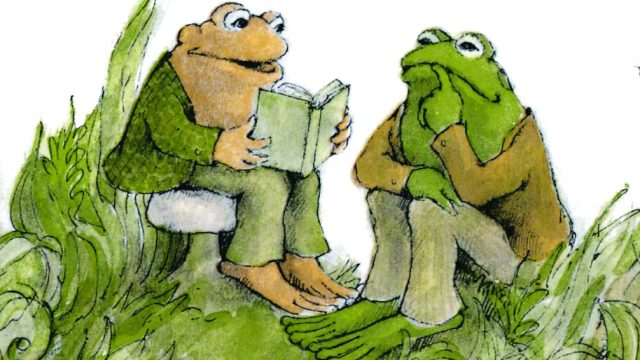This Week You Will Learn:
- where to find rural companionship
- why agents and executives suck
- which cartoon animals are hottest
- what to try instead of optimism and pessimism
Happy thanks to scb0212 for contributing this week! Send articles throughout the next week to ploughmanplods [at] gmail, post articles from the past week below for discussion, and Have a Happy Friday!
Sometimes all you need is the headline: How Frog and Toad became queer anti-capitalist cottagecore icons (by Cyrena Touros at Vox):
Across the four Frog and Toad books published in the 1970s, author and illustrator Arnold Lobel wrote with real humor about everyday adult problems (losing a button, not wanting to clean the house, feeling overwhelmed by a to-do list) and the desire to be seen, understood, and loved through your best and worst moments, without trivializing those insecurities. There’s plenty to love about the books as an adult reader, maybe even more to love, but [reader] Silas was also moved by context he didn’t grasp as a child. “As I looked back into the books,” he says, “I was reading about Arnold Lobel and his life and the fact that he was a gay man. His daughter had talked about how she felt like that was actually kind of him coming out in his own way because Frog and Toad have this ‘best friendship,’ but also, you can see in the books, it’s a partnership. As a gay man, I was really drawn to that.”
Max Read explores the prestige/network dichotomy and the contempt of modern entertainment executives for, well, entertainment:
Of course, the inverse is true as well: Just as it’s possible to make bad prestige TV, it’s equally possible to make good trash TV. Which is to say, “trash” (or “network,” or “middlebrow”) can be understood a set of formal markers just as “prestige” should be, and there can be a wide range of quality within the stuff that meets that criteria. We all know this to be true intuitively: There are reality shows made with care, intent, and attention to detail, just as there are prestige shows that are absolute dogshit. […] You don’t even have to watch the garbage to appreciate its role in the creative ecosystem. The Shield creator Shawn Ryan, who’s quoted in the story above, was a Nash Bridges writer; so too was Watchmen and The Leftovers creator Damon Lindelof. I’m not the first person to make this point, but the entire first generation of “prestige TV” in the 2000s–which is to say, 90 percent of the actually good prestige TV–was written by people who’d spent a lot of time learning to write quickly to a tight structure for a big audience, a set of skills no longer as widespread among writers, to dire consequences for audiences, who have essentially traded consistent, engaging entertainment for the convenience of on-demand streaming.
At Polygon Caroline Madden finally does what we’re all thinking and ranks Disney’s hottest animated animal characters:
20. Bernard, The Rescuers: Bernard is riddled with anxiety, and he has the mouse equivalent of a dad bod, but he’s also sweet and dedicated to his loved ones. As a member of the Rescue Aid Society, Bernard will always overcome his fears in order to do the right thing. Also, he’s got fashionable flair with his paperboy hat and distinguished turtleneck. But what I love the most about Bernard is his voice, supplied by Bob Newhart: It’s crackly and deadpan, yet gentle and kind.
And finally, courtesy Medium we have writer Cory Doctorow’s remarks to the graduating class of York University:
The belief that nothing will change — that nothing can change — is the wrecker’s most powerful weapon. After all, if you can convince people that nothing can be done, they won’t try to do anything. Thus: Margaret Thatcher’s dictum, “There is no alternative,” a polite way of saying “Resistance is futile,” or, “Abandon hope all ye who enter here.” This is inevitabilism, the belief that nothing can change. It’s the opposite of science fiction. As a science fiction writer, my job is to imagine alternatives. “There is no alternative” is a demand pretending to be an observation: “stop trying to think of an alternative.”

